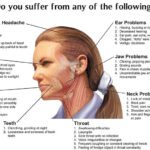Temporomandibular joint (TMJ) disease is an ache in the jaw that can be induced by a mixture of medical trouble. The TMJ attaches the lower jaw joint (also known as mandible) to the cranium in the ear. Specific facial muscles help in chewing. Trouble in this region can lead to neck pain, head pain, ear pain, headaches, facial pain. A mandible that is tough to open, locked in a position or difficulty in biting, jaw clicking and popping sounds as you bite. A headache, queasiness, and dizziness may be caused by TMJ condition. These symptoms often lead to conditions that cause anxiety. For an instance, tinnitus can disturb sleep and sleep disturbances have been linked to anxiety.
Studies have discovered a possible connection between anxiety and TMJ. Currently, studies have shown that anxiety can cause TMJ and vice versa. An extensive number of factors have made it hard to decide the accurate connection between these two; however, the connection appears to be present. Individuals experiencing anxiety might be at a higher risk for TMJ. Similarly, individuals experiencing TMJ might be at higher danger of having anxiety problems.
Anxiety Can Be Caused By TMJ
When individuals suffer from anxiety, they tend to grit their teeth or clasp their jaws. Extensive grinding or clenching often causes TMJ disease. Studies have established that people with more stress or anxiety also encounter pain induced by TMJ. These studies imply that anxiety could cause TMJ in some people; however, these two do not have a complete cause-effect relationship.
TMJ Disease Can Cause or Intensify Anxiety
A study was carried out in 2013 to test whether TMJ causes stress in rats. The rats were given an injection that induced swelling in the temporomandibular joint. After a timeframe with TMJ symptoms, the rats started to show anxiety. The pain induced by irritation in the temporomandibular joint may perhaps have been the reason that caused the anxiety in the rats.
Individuals that do not know that their TMJ is causing problems like headaches and dizziness may feel stressed about these inexplicable conditions. That nervousness can increase with every event of incomprehensible pain until the point that it weighs vigorously on the psyche and turns into serious anxiety. A similar snowball impact can happen to individuals who know the reason behind their symptoms and be restless.
However, in a few cases, TMJ doesn’t cause anxiety but intensifies already existing anxiety. Individuals that are already suffering from anxiety will have increased sensitivity to things that cause anxiety.
Know the Risk
It is ambiguous whether individuals who encounter nervousness from TMJ are prone to anxiety, or if the symptoms themselves are causing anxiety. Further studies will be required before researchers can find the connection.
With such a substantial number of possible causes of anxiety, it is imperative to talk with your specialist about your tension to better comprehend why you have anxiety. In the event that you encounter nervousness caused or exacerbated by TMJ, TMJ treatment may decrease your anxiety.









